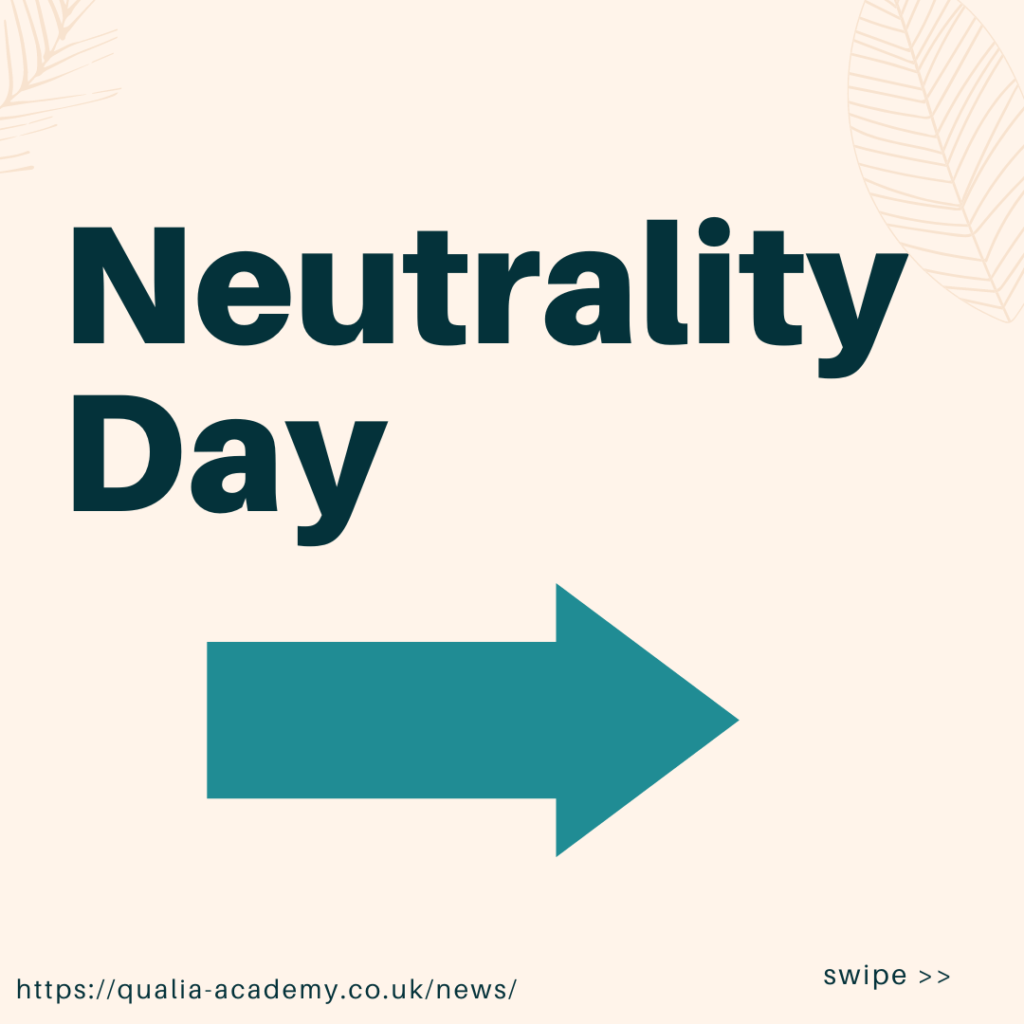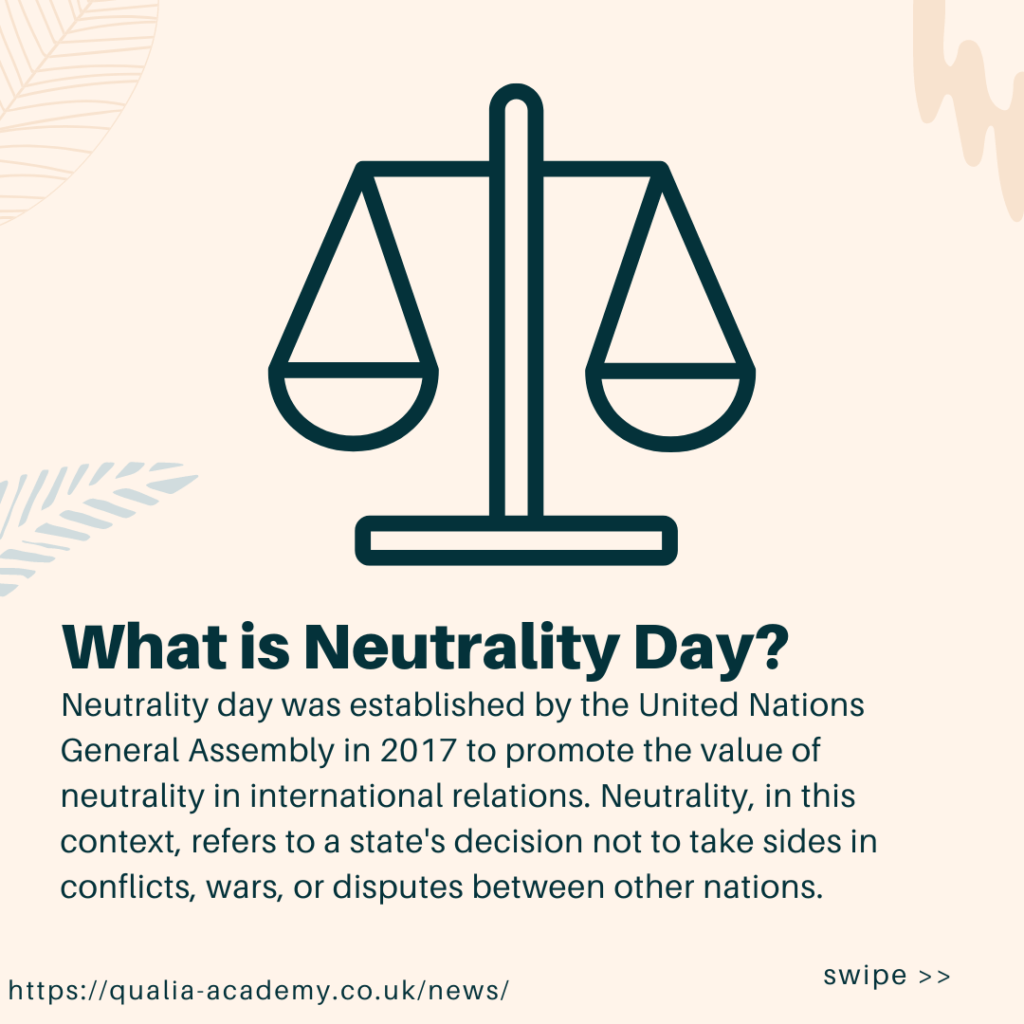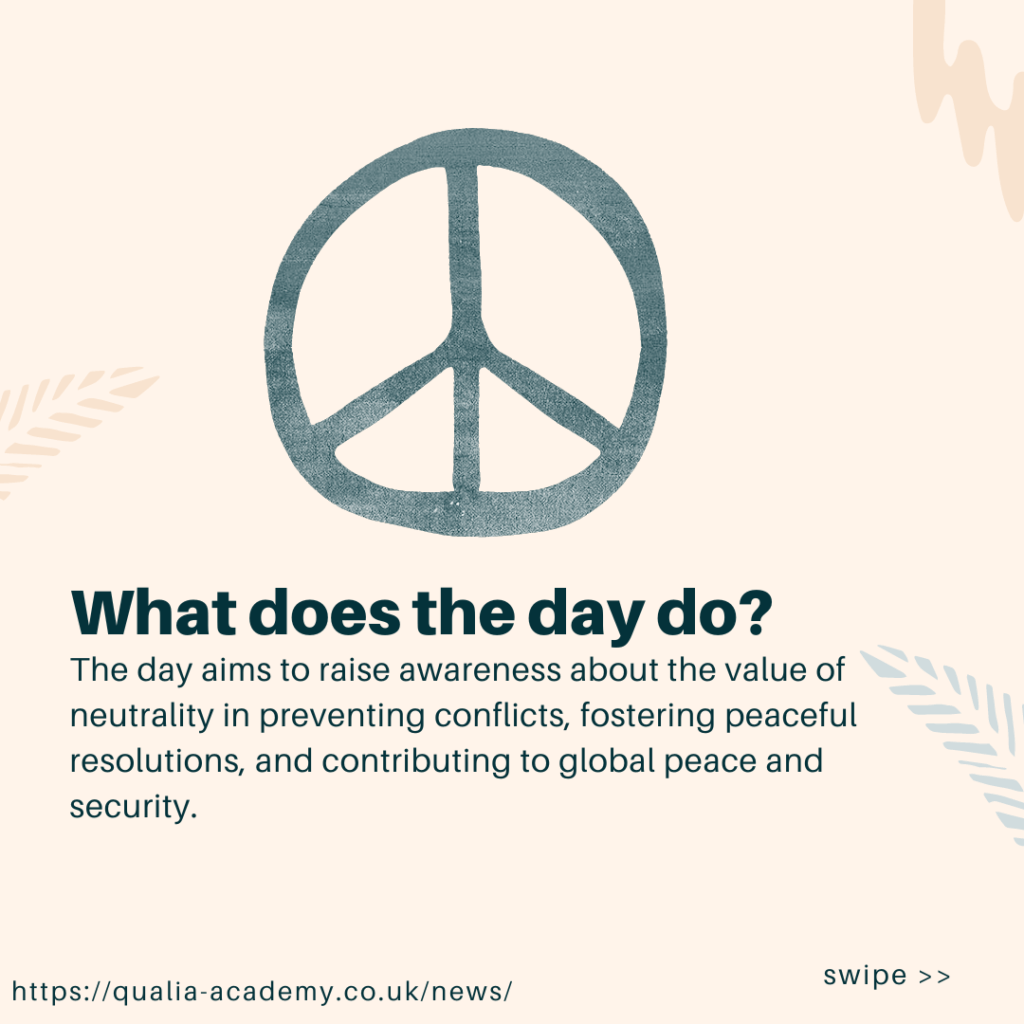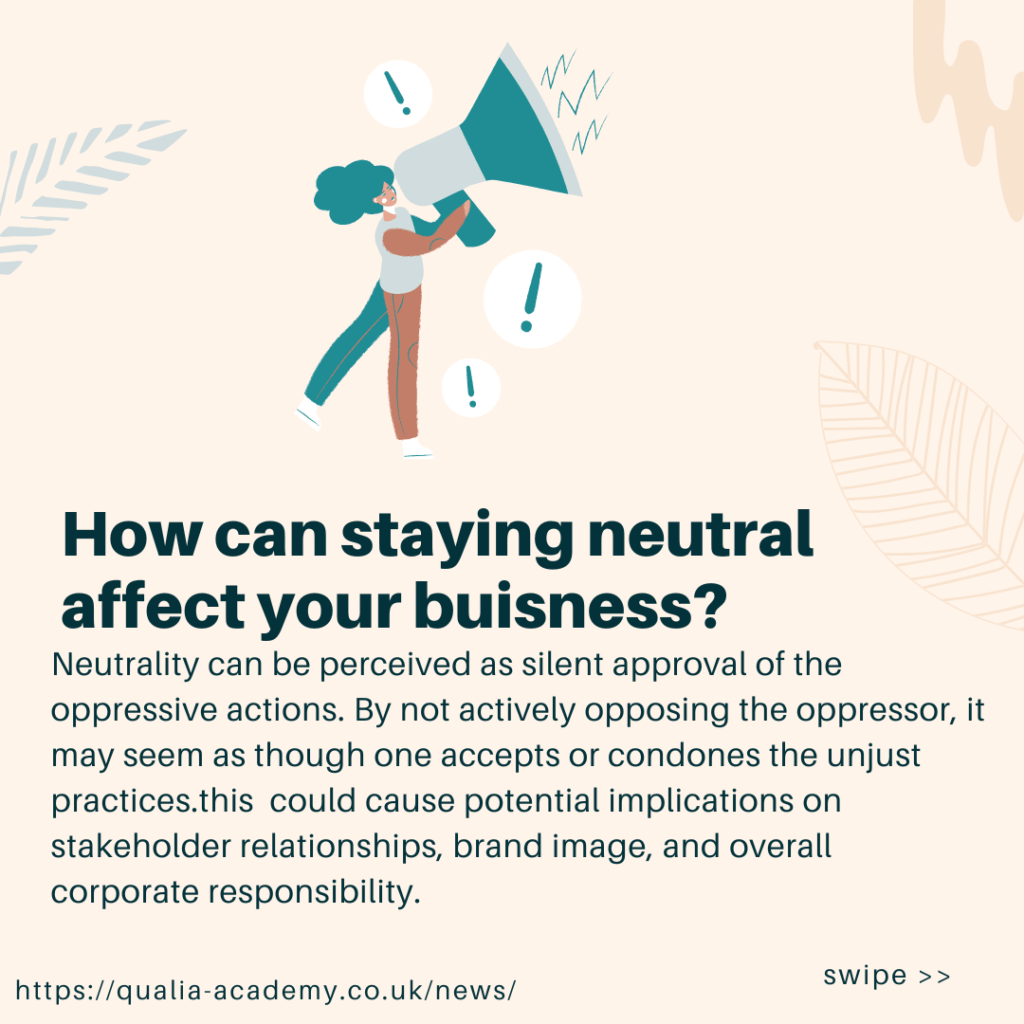Neutrality Day
The International Day of Neutrality is observed on December 12th each year. It was established by the United Nations General Assembly in 2017 to promote the value of neutrality in international relations. Neutrality, in this context, refers to a state’s decision not to take sides in conflicts, wars, or disputes between other nations.
On this day, various events and activities may take place to highlight the significance of neutrality in global affairs. It provides an opportunity for countries and organisations to reflect on the principles of neutrality and its role in contributing to international peace and security.
The day aims to raise awareness about the importance of neutrality as a means to prevent conflicts, protect human rights, and contribute to international peace and security. Nations that adhere to a policy of neutrality typically refrain from participating in military alliances, avoid taking sides in geopolitical disputes, and maintain a commitment to non-interference in the affairs of other countries.
The International Day of Neutrality provides an opportunity for countries and organisations to reflect on the principles of neutrality and to promote diplomatic solutions to conflicts. It emphasises the role of neutrality in fostering peaceful resolution, preventing the escalation of hostilities, and contributing to global stability.






How can staying neutral affect a business?
In a business staying neutral can also have various implications, especially in the face of ethical or social issues. Here are some considerations:
1. Customer Perception: Businesses are increasingly expected to take a stand on social issues. Remaining neutral when there is a clear ethical concern might lead customers, employees, and the public to perceive the company as indifferent or complicit in the issue at hand.
2. Employee Morale and Productivity: Employees may look to their employers for guidance on ethical matters. If a business remains neutral in situations of social or environmental concern, it could impact employee morale and productivity. Employees might feel disengaged or dissatisfied if they perceive the company as failing to align with their values.
3. Market Competitiveness: Businesses that actively engage in social responsibility and ethical practices may gain a competitive edge in the market. Neutrality on important issues could potentially make a company less attractive to consumers who prioritise values-aligned businesses.
4. Supply Chain and Partnerships: Neutrality on issues related to supply chain ethics or partnerships can have implications for business relationships. Companies may face scrutiny or backlash if they are perceived as turning a blind eye to unethical practices within their supply chain or among their business partners.
5. Regulatory Compliance: Neutrality may not always align with evolving regulatory expectations. Some industries face increasing pressure to address environmental, social, and governance (ESG) concerns, and neutrality could pose risks in terms of regulatory compliance.
6. Brand Image and Reputation: Remaining neutral in the face of significant social or ethical issues may impact a company’s brand image and reputation. Companies that actively address such issues often build a positive reputation, while neutrality might be viewed as a lack of commitment to corporate social responsibility.
While neutrality might be appropriate in certain situations, businesses should carefully consider the potential implications on stakeholder relationships, brand image, and overall corporate responsibility. In many cases, stakeholders and consumers expect companies to take a stand on important issues and contribute positively to societal well-being.
How can being neutral in wars affect you as a human being?
In a world rife with conflicts and geopolitical tensions, the concept of neutrality holds a unique and delicate place in the tapestry of human existence. The ability to remain impartial when considering wars is not just a political stance; it is a deeply personal and philosophical approach that can profoundly affect individuals within society. This blog post explores the implications of adopting a neutral perspective on wars and delves into various philosophical frameworks that shed light on this complex facet of human nature.
The Psychological Impact
Choosing to remain neutral in the face of wars can have both positive and negative psychological consequences. On one hand, it allows individuals to distance themselves from the emotional toll of conflict, preserving their mental well-being and promoting a sense of inner peace. However, this detachment can also lead to a perceived indifference, raising ethical questions about the responsibility one bears towards global issues and human suffering.
The Stoic Philosophy
Stoicism, an ancient Greek philosophy founded by Zeno of Citium, teaches the importance of maintaining inner tranquillity in the face of external chaos. Stoics argue that individuals have the power to control their reactions and emotions, urging people to focus on what they can change and accept what they cannot. Applying this philosophy to the context of war, a neutral stance aligns with the Stoic idea that one should not be easily swayed by external circumstances.
However, critics argue that complete emotional detachment may lead to apathy and a lack of empathy for those directly affected by conflict. Striking a balance between maintaining inner peace and acknowledging the human cost of wars becomes essential in a Stoic approach to neutrality.
The Just War Theory
In contrast to complete neutrality, the Just War Theory, rooted in Christian philosophy, provides a moral framework for evaluating the justification of wars. According to this theory, wars must meet certain criteria, such as having a just cause, a legitimate authority, and a reasonable chance of success, to be considered morally justified. For those adopting a neutral perspective, the Just War Theory provides a set of criteria to assess the ethical implications of conflicts, allowing for a nuanced understanding of global events.
Existentialist Dilemmas
Existentialist philosophy, championed by thinkers like Jean-Paul Sartre and Albert Camus, contends that individuals are responsible for creating their own meaning in a seemingly indifferent universe. Neutrality in the context of war raises existential questions about the role of individuals in shaping the world around them. Is neutrality a passive acceptance of the status quo, or can it be an active choice to contribute positively to global peace? Existentialists might argue that adopting a neutral stance requires a deep introspection into one’s values and a conscious decision to engage with the world authentically.
Conclusion
Being neutral when considering wars is a multifaceted aspect of human existence, blending psychological, ethical, and philosophical dimensions. Whether one aligns with the Stoic emphasis on inner peace, the Just War Theory’s moral evaluation, or the existentialist call for authentic engagement, the decision to remain neutral carries implications for individuals within society. Striking a balance between personal well-being and ethical responsibility is a delicate dance that each person must navigate, reflecting the ongoing dialogue between individual agency and collective humanity.
Author and image creator: Kenzi Roberts









